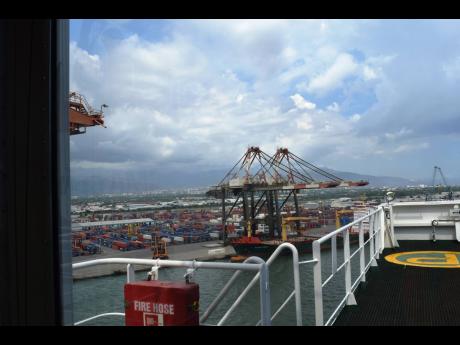Shipping delays months to resolution
The cost of freight has increased since the full onset of the COVID-19 pandemic, especially shipments from China that the business community says have tripled due to logistical bottlenecks. Trade out of China, and Asia generally, has been impacted...
The cost of freight has increased since the full onset of the COVID-19 pandemic, especially shipments from China that the business community says have tripled due to logistical bottlenecks.
Trade out of China, and Asia generally, has been impacted by a shortage of containers used to ship cargo.
Richard Pandohie, the president of the Jamaica Manufacturers and Exporters Association, JMEA, and CEO of Seprod Limited, said some of the price increases that Jamaicans are experiencing is a result of the pass-through of additional shipping costs to consumers.
Not only are businesses paying more to ship their goods, they also end up paying more duties due to a change in computation of freight charges by the Jamaica Customs Agency, said Pandohie and Jamaica Chamber of Commerce CEO Larry Watson.
There is no clear indication of when the container shortages will lift, which has led to a bidding war for containers on the world market. Trackers of the issue containers have been piling up containers at port destinations such as Los Angeles in the United States and Amsterdam in Europe.
However, the business associations say Jamaican companies could see an alleviation of shipping delays by early summer. Pandohie puts that date at around June or July, while Watson said the experts agree that the situation should improve by the latest September.
The shortage of containers was exacerbated last week by the blockage of one of the world’s busiest shipping channels, the Suez Canal in Suez, Egypt, by a stuck cargo ship, the MV Ever Given, that is reported to have disrupted world trade to the tune of US$9 billion per day. The ship was finally freed from by tugboats on Monday after dredging of the area.
But even before the added dilemma presented by the blocked shipping channel, the business sector had been bracing for the demand-side impact of the US$1.9 trillion stimulus package passed into law in the United States.
The Biden administration made good on its election promise to put US$1,400 in the hands of Americans, among other measures, in addition to a raft of other measures aimed at cushioning the effect of the year-long COVID-19 pandemic. Pandohie said that to the extent that US consumers are expected to spend the money on goods and services, it will further impact the demand for foreign goods and the need for more shipments.
“That stimulus is going into the hands of the people who spend the most. That will create massive demand in the biggest consumer market in the world, which will no doubt feed into the need for more containers, which will drive up shipping costs even more,” Pandohie said.
The JMEA president said that from last year, with China recovering faster than other countries at the height of the pandemic, the world’s No. 2 economy and super trader was ready to do business at a time when many others were still on lockdown.
During the period, for every 10 containers of cargo shipped to North America and Europe, China was getting only four containers back, he noted – effectively slowing the pace at which it could fill future orders.
“This created a massive imbalance regarding where the containers were located. The result is that there was a shortage of containers in China and the rest of them were scattered all over the world,” said the JMEA president, noting that this was what sparked the bidding war.
“The result of the shippers not having enough containers is that they started to pay premium prices and acting aggressively in the market. That led to a huge spike in rates,” he added.
The fallout in places like Jamaica, with far less clout than large economies, has not only been higher freight charges but also shipping delays due to channel-switching and other pressures. One of the knock-on effects of the pandemic’s impact on air travel, Pandohie noted, is that with fewer flights, some cargo that used to be delivered by airplanes had to switch to transportation by ship.
That’s been the experience of courier company RTA Biz that had to switch from its twice-weekly arrangement with an air cargo carrier to a shipping consolidator with space to spare in their weekly shipping container that leaves Miami on a Friday and arrives the following Monday.
The new mode of cargo transport has had both upsides and downsides for RTA Biz.
“What that does is to give me the ensuing days to do clearing and such,” said Managing Director Ryan Anderson. “It is cheaper than air cargo and even with the delays, there is less uncertainty,” he said.
But it also upsets customers, especially those with commitments to meet, a situation the company tries to manage through discounts and freebies.
“There are some that will understand the situation, but there are also others who still remain upset even after the discount because no amount of inducement will compensate for the missed opportunities,” Anderson said.
For the wider business community, the delays have been a headache, especially where it wreaks havoc with schedules that were crafted around commitments.
“People are reaching out to me with the concern that one to two-month shipping delays are affecting their schedules, especially for time-sensitive projects,” Pandohie said.



